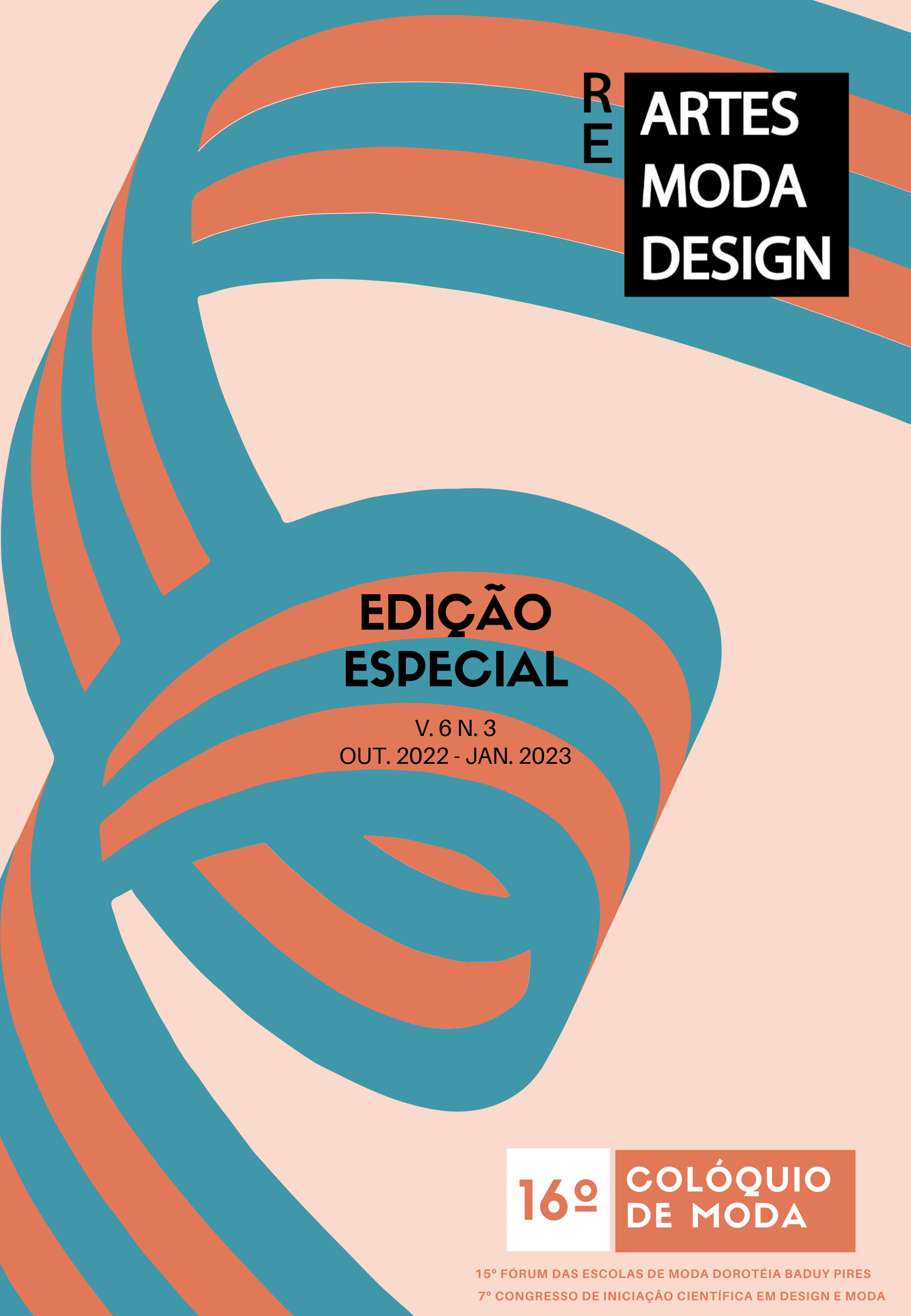Os acessórios afiados da putinha terrorista: moda, gênero e autodefesa em Lyz Parayzo
DOI:
https://doi.org/10.5965/25944630632022e2274Palavras-chave:
Ativismo artístico, Objetos vestíveis, Dissidência de gêneroResumo
O objetivo é examinar produções recentes da multiartista brasileira Lyz Parayzo que envolvem joalheria e outros objetos vestíveis. O foco específico da análise é a série de flyers intitulada “Putinha Terrorista” (2016-2018). Analisam-se os textos e imagens fotográficas incluídas nos flyers, em especial quando objetos vestíveis de autoria da própria artista aparecem como elementos de figurino. A análise evidencia a maneira como Lyz Parayzo faz intenso uso de códigos da Moda para produzir uma arte ativista em prol da população transvestigênere. A contribuição do estudo decorre do fato de não haver, até onde pudemos avaliar, pesquisas que tenham analisado a obra de Lyz Parayzo especificamente pela perspectiva da Moda.
Downloads
Referências
ARAÚJO, Emanuel. A arte da sedução: sexualidade feminina na colônia. In: DEL PRIORE, Mary (org.). História das mulheres no Brasil. São Paulo: Contexto, 2013.
BENTO, Berenice. Transviad@s: gênero, sexualidade e direitos humanos. Salvador: EDUFBA, 2017.
CRANE, Diana. Ensaios sobre moda, arte e globalização cultural. São Paulo: Senac, 2011.
ENTWISTLE, Joanne. The fashioned body: fashion, dress, and modern social theory. UK: Polity Press, 2000.
FERREIRA, Debora Armelin. A arte como arma em território hostil: enfrentamentos nas produções de Lyz Parayzo. Cidades, Comunidades e Territórios, Lisboa, n. 39, p.1-17, 2019.
KUNZLE, David. Fashion and Fetishism: Corsets, Tight-Lacing and Other Forms of Body-Sculpture. London: The History Press, 2013.
LATTAVO, Patrícia. A participação do espectador: de Lygia Clark à contemporaneidade. O Fermento Revista, 02 dez. 2020. Disponível em: http://ofermentorevista.com.br/2020/12/02/100-anos-de-lygia-clark/. Acesso em: 12 jun. 2022.
MARX, Karl; ENGELS, Friedrich. Manifesto do Partido Comunista. São Paulo: Global Editora, 1986.
McCLINTOCK, Annie. Couro Imperial: Raça, Gênero e Sexualidade no Embate Colonial. Campinas: Editora da Unicamp, 2010.
MOMBAÇA, Jota. Rumo a uma redistribuição desobediente de gênero e anticolonial da violência! In: PEDROSA, Adriano; MESQUITA, André (Org.). Histórias da sexualidade: antologia. São Paulo: Edições MASP, 2017. p. 301-310.
MORANDO, Luiz. Enverga mas não quebra: Cintura Fina em Belo Horizonte. Uberlândia: O Sexo da Palavra, 2020.
PASTORAL DA MULHER DE BELO HORIZONTE (2012, nov. 30). A propaganda da prostituição perante a legislação penal. Disponível em: http://pastoraldamulherbh.blogspot.com/2012/11/a-propaganda-da-prostituicao-perante.html. Acesso em: 10 jun. 2022.
PEDROSA, Adriano; RJEILLE, Isabella; LEME, Mariana (org.). Histórias das mulheres, histórias feministas. São Paulo: Edições MASP, 2019.
QUEIROZ, Tania; MOSS, Angela. Lyz Parayzo: artista do fim do mundo. Performatus, Inhumas, vol. 5, n. 17, n.p., 2017.
QUINALHA, Renan. Contra a moral e os bons costumes: a ditadura e a repressão à comunidade LGBT. São Paulo: Cia. das Letras, 2021.
STEELE, Valerie. Fashion and eroticism: ideals of feminine beauty from the victorian era through the aazz age. Oxford: Oxford University Press, 1985.
STEELE, Valerie. Fetish: fashion, sex & power. Oxford: Oxford University Press, 1996.
TINOCO, Bianca. “Eu sou o melhor que eles têm”: a potência de Lyz Parayzo, puta-pornô-terrorista. Anais do XXXVIII Colóquio do Comitê Brasileiro de História da Arte, Florianóplis, 2019.
TREVISAN, João Silvério. Devassos no paraíso: a homossexualidade no Brasil, da colônia à atualidade. Rio de Janeiro: Objetiva, 2018.
WOLF, Naomi. O mito da beleza: como as imagens de beleza são usadas contra as mulheres. Rio de Janeiro: Rosa dos Tempos, 2021.
Downloads
Publicado
Como Citar
Edição
Seção
Licença
Copyright (c) 2022 Emerson Silva Meneses, Martin Jayo

Este trabalho está licenciado sob uma licença Creative Commons Attribution 4.0 International License.
- Autores mantém os direitos autorais e concedem à revista o direito de primeira publicação, com o trabalho simultaneamente licenciado sob a Licença Creative Commons Attribution 4.0 Internacional, que permite:
1. Compartilhar — copiar e redistribuir o material em qualquer suporte ou formato para qualquer fim, mesmo que comercial.
2. Adaptar — remixar, transformar, e criar a partir do material para qualquer fim, mesmo que comercial.
O licenciante não pode revogar estes direitos desde que você respeite os termos da licença.De acordo com os termos seguintes:
1. Atribuição — Você deve dar o crédito apropriado, prover um link para a licença e indicar se mudanças foram feitas . Você deve fazê-lo em qualquer circunstância razoável, mas de nenhuma maneira que sugira que o licenciante apoia você ou o seu uso.
2. Sem restrições adicionais — Você não pode aplicar termos jurídicos ou medidas de caráter tecnológico que restrinjam legalmente outros de fazerem algo que a licença permita -
Plágio, em todas as suas formas, constitui um comportamento antiético de publicação e é inaceitável. Esta revista utiliza o software iThenticate de controle de similaridade.






